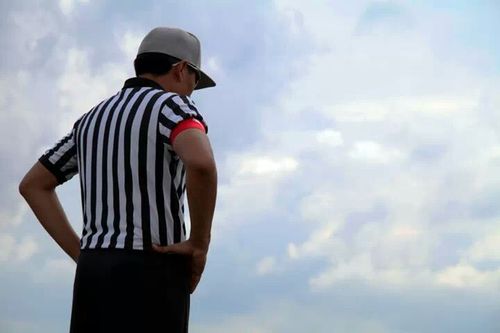- Rule, Britannia, no more?
- Unpopular Opinions: US Quadball Cup 2023
- Proven Contenders: University of Virginia
- Proven Contenders: Rutgers University
- Proven Contenders: University of Michigan
- Proven Contenders: Creighton University
- Different Perspectives: A Look Inside USA Ultimate
- Antwerp QC, Much of Belgian Core, Leaves Competitive Quidditch
The Birth of the IRDP and the Troubled Waters Ahead
- Updated: May 6, 2014

The IRDP scored its first major boon before even announcing its existence, bringing Andrew Canto back into the fold. Credit: Michael E. Mason/IQA Staff
Perhaps the biggest news of the summer so far broke yesterday, with almost no publicity, fanfare or commentary. The catalyst was an official announcement stating that what was previously the Referee Development Team (RDT) of the IQA would be breaking away from the organization to form the independent International Referee Development Program (IRDP).
I think it’s important to start with the high points. Most notably, Andrew Canto will be returning to referee administration after nearly a year off. Simply put, Canto is the best thing to ever happen to quidditch refereeing. As the former head of RDT, his knowledge, lack of ego, sensibility, and, most importantly, extensive background knowledge in officiating other sports, brought RDT, and refereeing as a whole, to new heights. Canto is a huge boon for the IRDP: It’s no accident that Canto’s name is the only one mentioned in the announcement other than the new organization’s manager, Sequoia Thomas, and Assistant Manager, Chris Beesley.
The IRDP has also taken all of the right initial steps to garner support. It has most of the referee community’s most notable people already on board, and has proven in just three paragraphs that its visions and goals are international, a tactic that will undoubtedly be well received by countries that have felt under-appreciated in the past.
But, while the positive vibes are flowing from this announcement, it’s almost impossible to ignore the underlying conflict it’s almost surely built on. Simply put, I can’t imagine a scenario in which RDT would have felt the need to separate from the IQA that isn’t an overall unhappiness with how they’ve been treated in their time under the association’s banner. And, if that is the case, it’s hard to believe the IQA is quietly accepting this move. It might not be a coincidence that the USQ is not mentioned in the list of organizations the IRDP is currently in talks with.
If my speculation is correct, and the two organizations aren’t on the same page, then, unfortunately for the IQA, the IRDP holds all the cards. Simply put, the IQA has been caught at the worst possible time. They are currently in a hiring freeze during the transition to the USQ, and have already seen the stepping down of their Gameplay Director, Human Resources Director, and multiple Regional Directors, all in the past month. It’s hard to imagine them rebuilding any semblance of an RDT in this climate of change, never mind one that could hold a candle to the people they lost to the IRDP, especially with many referees likely to stand by their former leaders.
If the IQA were to give in to the IRDP, a decision that may have been made for them, it wouldn’t be without precedent. From All About Group Travel to Alivan’s, the IQA has worked exclusively with outside organizations in the past. Not to mention that next year’s coach certification will be through an outside company’s process, something certifying referees through an outside organization would fall very much in line with. And, as a third party, the IRDP may be able to improve refereeing in a more effective way than they could have under the umbrella of the IQA.
But the USQ also has every right to fight back, and has the power to do so. They control the games, and in one simple ruling could make it impossible for IRDP referees to officiate USQ games. Even if such a threat was nothing more than a bluff, as such a ruling would almost surely be met with heavy backlash, it could send the whole conflict into weeks if not months of ineffective gesturing from both sides. And while the summer has just begun, September really isn’t that far away.
This past weekend, at a mercenary tournament in Maryland, the referees tried out a new system of officiating a game, involving two assistant referees that act more like soccer line judges and a head referee that works diagonally across the field. While it wasn’t a perfect system, and had plenty of kinks to be worked out, it truly exemplified everything the summer season can be: A real chance to innovate and improve on our sport.
In the wake of this announcement, we are left holding out hope that the USQ and the IRDP can come to a quick and mutually beneficial agreement, so that the opportunity for improvement over the summer isn’t ignored for a long and ugly conflict.

10 Comments